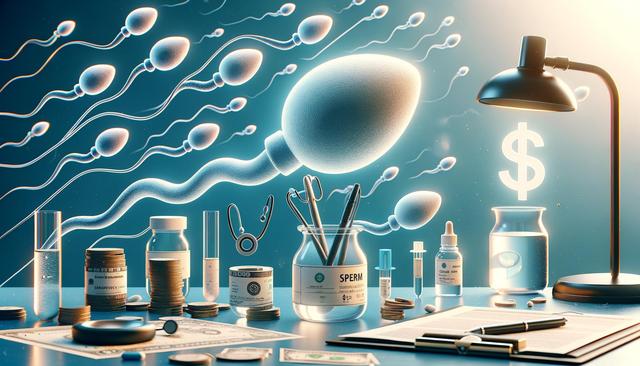Understanding the Basics of Paid Sperm Donation
Paid sperm donation is a process where individuals can donate sperm for money through licensed facilities, such as a sperm donor clinic or sperm bank. This arrangement serves a dual purpose: it offers financial compensation to the donor and helps individuals or couples who are experiencing fertility challenges. Sperm donation is regulated to ensure safety, ethics, and medical standards are upheld, making it a reliable and structured method of contributing to reproductive health services.
To become a sperm donor, individuals typically visit a local sperm donor clinic or apply through sperm bank applications. These facilities handle the collection, testing, and storage of the sperm. Donors are compensated per donation, and while the amount varies by location and clinic, it can provide a consistent supplementary income. Many donors find value in knowing they are helping others create families, making the experience both financially and emotionally rewarding.
Eligibility Criteria: Who Can Become a Sperm Donor?
Not everyone is eligible to donate sperm for money. Clinics follow strict guidelines to determine who qualifies, ensuring the health and suitability of the donor. The screening process is comprehensive and may vary slightly depending on the sperm donor clinic, but generally includes the following criteria:
- Age range: Most clinics accept donors between 18 and 39 years old.
- Health status: Donors must be in good physical and mental health.
- Height and education: Some clinics have specific preferences related to physical traits or educational background.
- Non-smoker and drug-free: A healthy lifestyle is essential.
Potential donors should be ready to undergo multiple interviews, complete detailed medical and family history forms, and perform various health screenings. Genetic testing and infectious disease screening are typically required to ensure that the sperm is safe for use in fertility treatments. If the candidate meets all eligibility criteria, they proceed to the next steps in the sperm donor process.
The Sperm Donor Process: Step-by-Step
The sperm donor process involves several steps, each designed to ensure that the donor is a suitable candidate and that the sperm collected meets high-quality standards. Here’s a simplified breakdown of the typical process:
- Application: Fill out a sperm bank application, which includes detailed personal, medical, and genetic information.
- Initial Screening: A clinic staff member conducts a preliminary interview and may collect a semen sample for analysis.
- Medical Evaluation: Includes blood tests, urine tests, and a physical exam.
- Genetic Testing: Screening for inherited conditions to prevent passing on genetic disorders.
- Ongoing Donations: Once approved, donors return regularly to provide samples over several weeks or months.
Each donation is collected on-site in a private, safe setting. The samples are then frozen and quarantined until the donor passes all required screenings. The process is managed confidentially, ensuring the privacy of donors and recipients alike.
Compensation and Frequency of Donations
One of the main incentives to donate sperm for money is the compensation. Donors typically earn a payment for each approved donation. While the exact amount can vary by region and clinic, active donors who visit the clinic regularly may earn a few hundred dollars per month. Some clinics also offer bonuses for consistent attendance or referrals.
Donors are usually expected to commit to a donation schedule. Depending on the clinic’s policies, this could involve visiting the sperm donor clinic once or twice a week for several months. To maintain optimal sperm quality, donors are often asked to abstain from ejaculation for two to three days before each donation. This regularity helps clinics build a sufficient supply and ensures a reliable match for intended parents.
It’s important to note that while compensation is a benefit, the donation process is not a quick cash solution. The initial screening and approval stages can take several weeks. However, once accepted, the opportunity to earn supplemental income while helping others can be both meaningful and rewarding.
Legal and Ethical Considerations
Before starting the sperm donor process, it’s essential to understand the legal and ethical frameworks involved. Donors typically waive parental rights through signed agreements with the sperm bank or clinic. This ensures that recipients have full parental authority and that donors are not legally or financially responsible for any resulting children.
All donations are anonymous unless both parties opt into an identity release program, which some clinics offer. Ethical considerations also include being truthful on sperm bank applications and fully understanding how and where donations may be used. Donors are encouraged to ask questions and read all agreements carefully before committing.
Many sperm donor clinics also limit the number of families that can be created from one donor to prevent overuse and potential future complications. This limit helps maintain ethical standards and protects the interests of everyone involved. Informed consent, transparency, and responsible practices form the foundation of every reputable sperm donation program.
Conclusion: A Meaningful Way to Make a Difference
Pursuing paid sperm donation can be a unique and rewarding experience. For those who meet the eligibility criteria and are willing to commit to the sperm donor process, this opportunity offers more than just income—it provides a chance to support individuals and couples on their journey to parenthood. By working with a certified sperm donor clinic and following the appropriate steps, donors can contribute in a meaningful, confidential, and ethical way.
If you’re considering this path, take the time to research local clinics, review sperm bank applications, and understand the full scope of responsibilities. Donating sperm for money isn’t just a financial decision—it’s a way to make a lasting impact on lives and families.




Leave a Reply